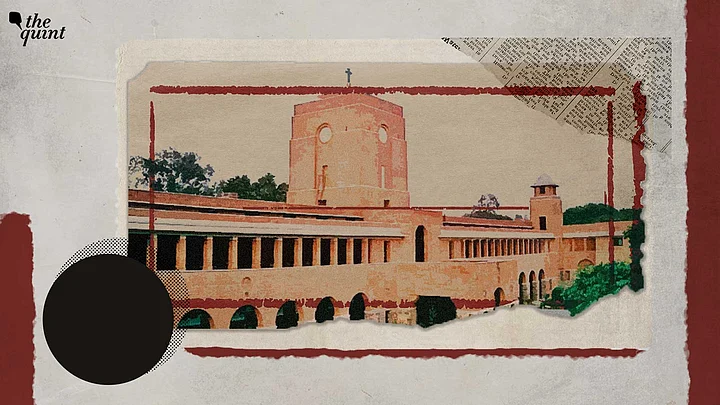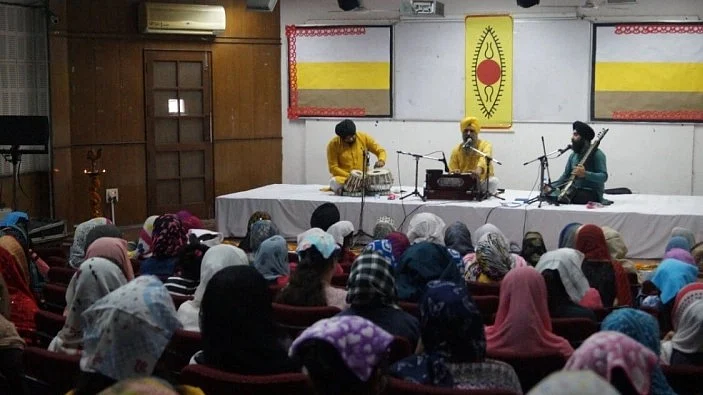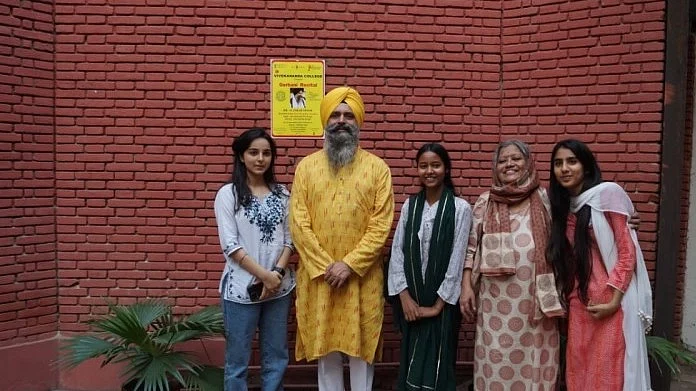I became an enthusiastic professor at the Delhi University (DU) because of the years I spent as a student there. I consider myself fortunate for having studied at DU for six years and having taught there for 45 years.
I retired as an Associate Professor from DU’s Vivekananda College in 2017 but it has and always will be an integral part of my life. DU has now completed 100 years and has entered a new era. I hope that the education it imparts continues to be holistic and is not just narrowed down to information accumulation.
But more on that later. First, let’s take a trip down memory lane.
‘Excellence Inside Classroom, Enriching Outside’
I was a BA (English) student at one of the premier colleges of DU -- Jesus and Mary College (JMC) in south Delhi. JMC was set up in 1968, while I joined in 1969, just a year after. At that time, there was no Masters course being taught there. So, I pursued my Masters in English Literature from Miranda House in North Campus from 1972-74.
At that time, DU was at the pinnacle of academic excellence, and it provided an enriching experience outside the classroom too. It was one of the six or seven central universities then. Others were Jawaharlal Nehru University (JNU), Jamia Millia Islamia, Banaras Hindu University (BHU), Aligarh Muslim University (AMU) and Hyderabad University.
I owe my gratitude to DU as it truly was the best at everything. The B.Ed course, which is taught at the Department of Education next to Miranda House in North Campus is one of the best courses in teaching across the world. I had pursued that in 1975-76. At that time, the course was for one year but now it is for two years.
There’s no doubt that DU had and has some of the best teachers, who do more than just go through the syllabus with the students. Many go on to shape people, teach valuable life lessons, and become friends.
One of my professors during my M.Phil years, Professor GK Das had told me, “It is not important if you get a job in the best college but it is important that wherever you go to teach, you do your best.”
'Delhi Has Changed Now'
As I reminisce about DU in the ‘60s and the ‘70s, I think about all the time I spent participating in theatre. My real love and passion for it started when our teachers taught us Shakespeare in college. It intensified during my post-graduation years.
Shakespeare’s plays, tragedies, and comedies! We used to sit in our college canteen or the rocks in our college garden and have our tutorials. Theatre continues to be an integral part of DU, with theatre groups across colleges.
From when I was a student in DU to now, even means of commuting to the various campuses of the university has undergone a major change. In those days, I used to walk from Baba Kharak Singh Marg to Parliament Street and take DTC bus no 101 to college. I used to take the University Special to come back home. It was a different experience entirely.
We now have the Delhi metro. But at that time, 98 percent of the students used to travel by DTC buses only.
Oh and what a fashionable time it was! I remember bell bottoms and tops were very in in the ‘60s but I used to go to college in salwar kameez. Many girls would come wearing sarees too. But no one was as fashion conscious as students are today.
In my graduation years, Yuva Vani (a youth centric radio station which had programmes on education, skill development and employment) had started. I took part in that a lot and felt excited about radio journalism.
When I was teaching at Vivekananda College, there used to be a radio programme called University of the AIR, in which they would invite teachers to talk for 20 minutes about a play or a poem. Now, we live in the world of podcasts. See, how things have changed in the last few decades, the many leaps that technology has taken.
'Used To Take My Students To Mandi House To Watch Plays'
A lot is spoken and written about DU’s North and South Campuses but did you know it also has a campus in east Delhi? In fact, I taught at Vivekananda College, which is located in east Delhi, for around 40 years.
I had many students from Shahdara and Ghaziabad areas. In fact, there were also students in my class who used to travel by train from Meerut daily. Such has been the dedication of students to study in DU. Many of my students were first-generation learners from their families.
For me, being a teacher never meant confining interaction to the classroom. I went well beyond the prescribed syllabus. Apart from my own subject, which was English Literature, I was also interested in theatre and in sensitising students to drama and the immense potential it has -- not just in the written word but also in performance.
And that has led to some amazing discoveries. The atmosphere in DU is conducive to such learnings and growth.
When I was in college, my professors had always encouraged students to take part in extracurricular activities such as debates, dramatics, and the arts. It is from them that I drew the savage enthusiasm to encourage my students as well. My (almost) five decades in DU as a student and teacher have come full circle in many ways.
I used to take my students to watch plays at Mandi House and then bring them back to college. Through such experiences, I was able to draw my students to the stage. Let me tell you about one of my students from Ghaziabad, who I got interested in theatre.
She later on ended up pursuing Journalism and Mass Communication from Jamia and today is a scriptwriter for some leading film directors in Hindi cinema. She called me one day and said, “If I had just studied what was given in the course, then I would not be the person that I am today.”
I also used to organise concerts under SPICMACAY (Society for the Promotion of Indian Classical Music And Culture Amongst Youth). At that time, there were students who were hooked onto indie pop, and I used to take them to concerts by the top-most musicians and dancers. It was like discovering so much together.
At Vivekananda College, I organised various recitals and concerts during the 1990s and 2000s – Bharatnatyam recital by Yamini Krishnamurthy, classical music by Shubha Mudgal, classical musicians Pandit Rajan and Sajan Mishra, Kathakali artiste Sadanam Balakrishnan, and Rahim Fahimuddin Dagar, who was a doyen of Dagarvani, which happens to be a restricted art. The last one I organised was a gurbani recital by Dr. Alankar Singh.
- 01/02
Gurbani recital by Dr Alankar Singh under the aegis of SPICMACAY taking place at Vivekananda College in Delhi.
(Photo: Vivekananda College website)

- 02/02
Dr Alankar Singh seen with Prof Saraswati Subbu and her students.
(Photo: Vivekananda College website)

I tried to make their education completely holistic, enriching and fulfilling. This is what DU stands for.
'A Teacher Is A Constant Learner'
Helping students open up their minds is both challenging and rewarding. I learnt a lot from my students too. My classes consisted of an assortment of students -- some of them came from economically backward backgrounds. As a teacher, it was mentally stimulating to address the requirements of all the students given the timespan of one-hour lectures.
At Vivekananda College, I was able to evolve as a teacher. A teacher is a constant learner. The dynamics of learning in the classroom have been terrific at DU.
'Nothing Can Replace A Teacher in the Classroom'
Now getting back to what I wish for DU in the next 100 years. My view is a conservative one but I believe that virtual learning can never replicate actual teaching at universities. After the pandemic or as a result of it, one has seen that e-learning has increasingly entered classrooms.
Although I retired in 2017, I know of many teachers at DU who were upset about online teaching and have shared their first-hand experience with me. I know many of the teachers were waiting for online classes to get over. I believe that nothing can replace a teacher in the classroom.
Saraswati Subbu taught English Literature at DU for over 45 years. She has taught at several colleges including Janaki Devi Memorial College, Bharti College, Shyama Prasad Mukherjee College and Vivekananda College. She retired on 30 September 2017.
(As told to Aakriti Handa)
(At The Quint, we question everything. Play an active role in shaping our journalism by becoming a member today.)


